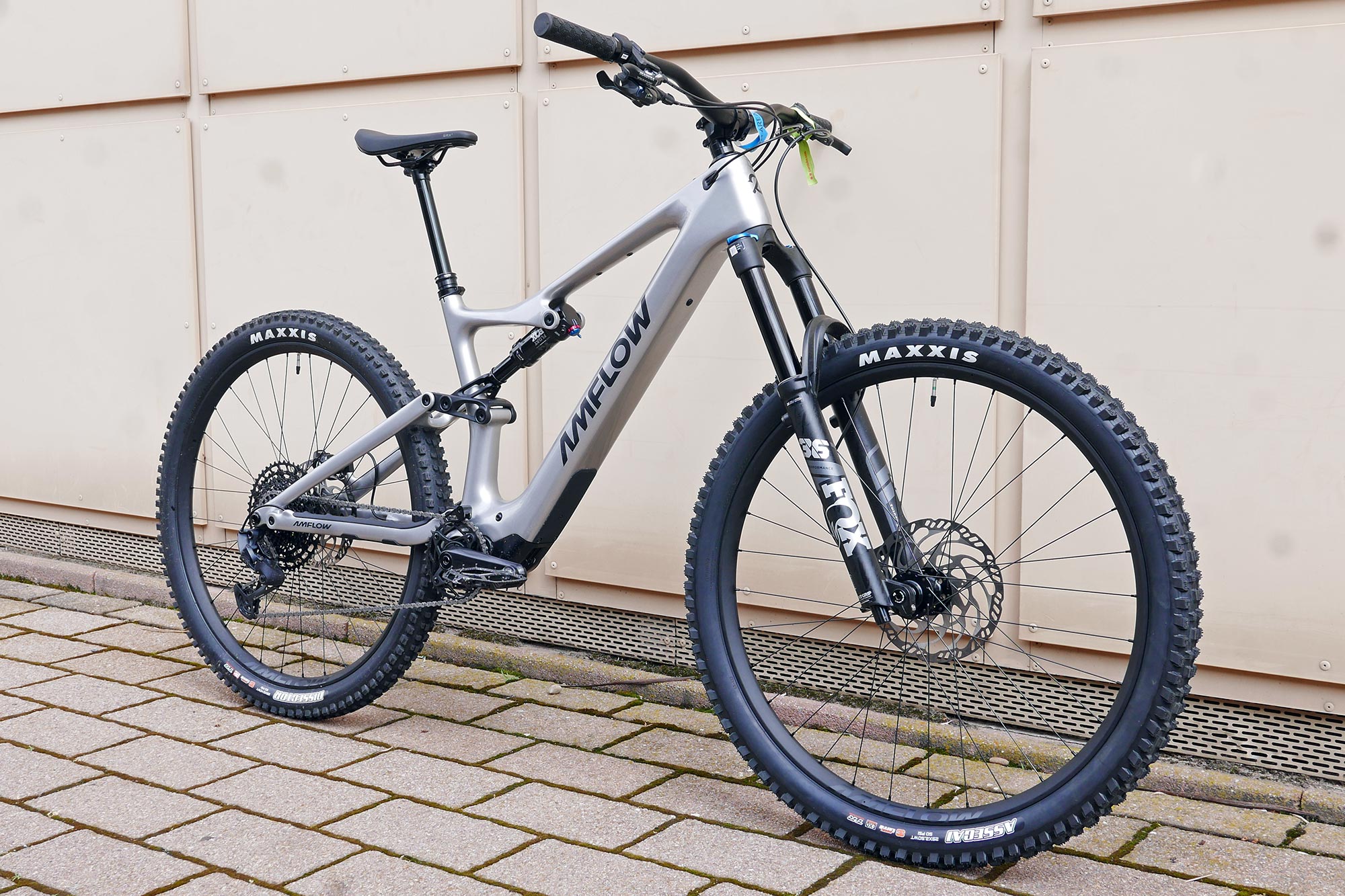Earlier this summer, DJI introduced us to their first foray into ebikes with the light but powerful Avinox motor, set inside an all-new carbon Amflow PL eMTB. We’ve known and flown DJI cameras and drones for years, but Amflow is a completely new and unknown upstart to the world of bike manufacturing. So we wanted to take a closer look at their first-generation Amflow PL Carbon to see what we can expect from the first platform for the new DJI ebike powertrain…
So, who is Amflow, again?
The first important thing to note about Amflow, is that the new bike brand is not actually a part of DJI. And it’s not necessarily going to be exclusively an eMTB-only brand. Amflow was incubated by DJI. The drone, camera, and now ebike drive system manufacturer needed an eMTB platform to launch their new motor. So to keep development under wraps until they were ready to launch, DJI started with in-house technology experts who rode mountain bikes, and brought together a group bike design and carbon manufacturing experts to create that eMTB platform.
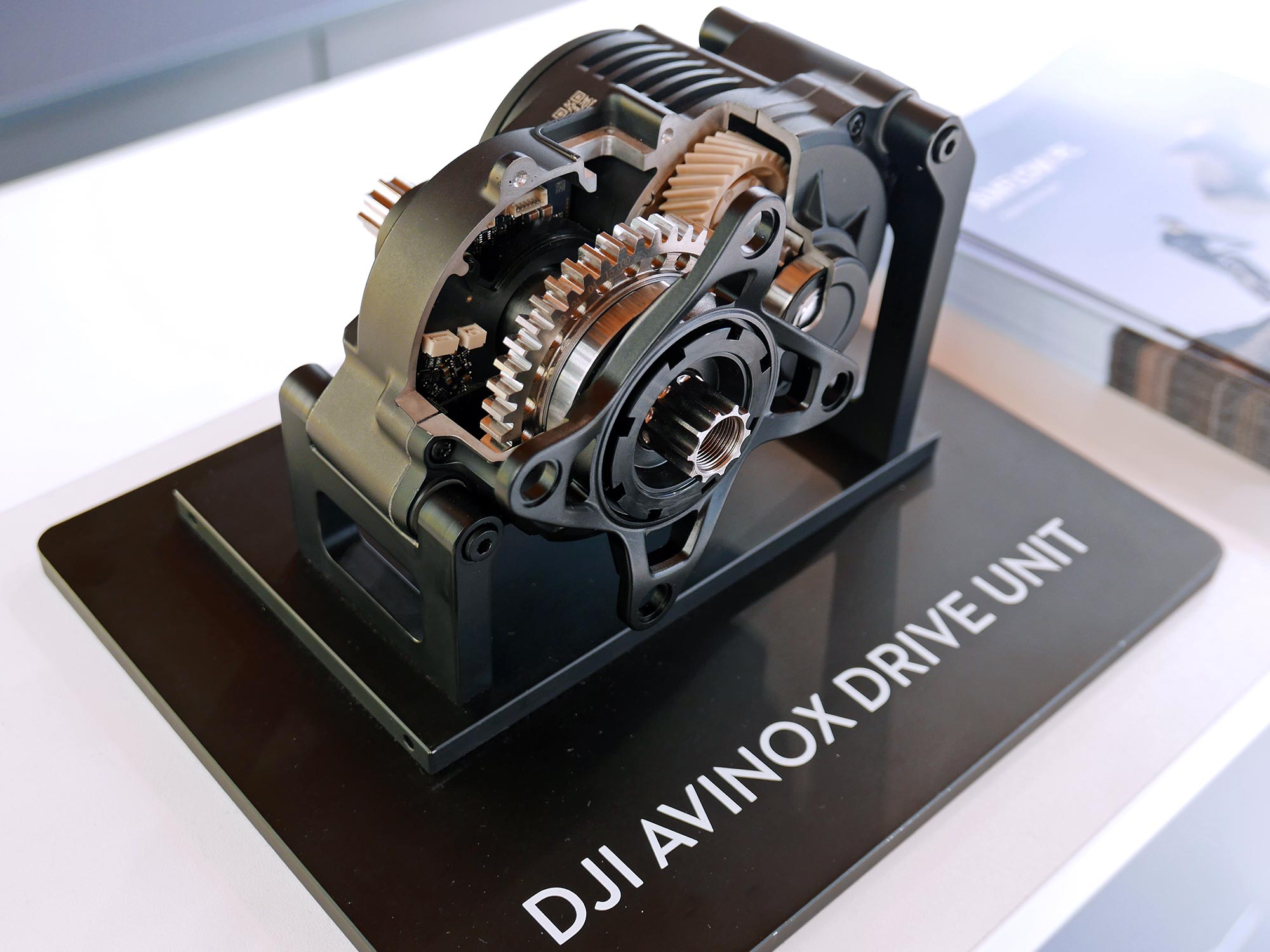
So yes, the bike products of Amflow began as a platform to test and showcase the DJI Avinox system within a customized and seamlessly matching design. But then, they quickly split off Amflow to develop bikes on their own. And going forward, Amflow is slated to grow increasingly independent in all business aspects, from product development to day-to-day operations.
So now the ebikes are designed by Amflow separate from DJI, with material and manufacturing support from existing specialists in the bike industry – think geometry & kinematics optimization and shock tuning. And Amflow make the PL Carbon frame in Asia, in cooperation with experienced carbon and bicycle manufacturers.
Amflow PL Carbon all-new lightweight 150/160mm eMTB
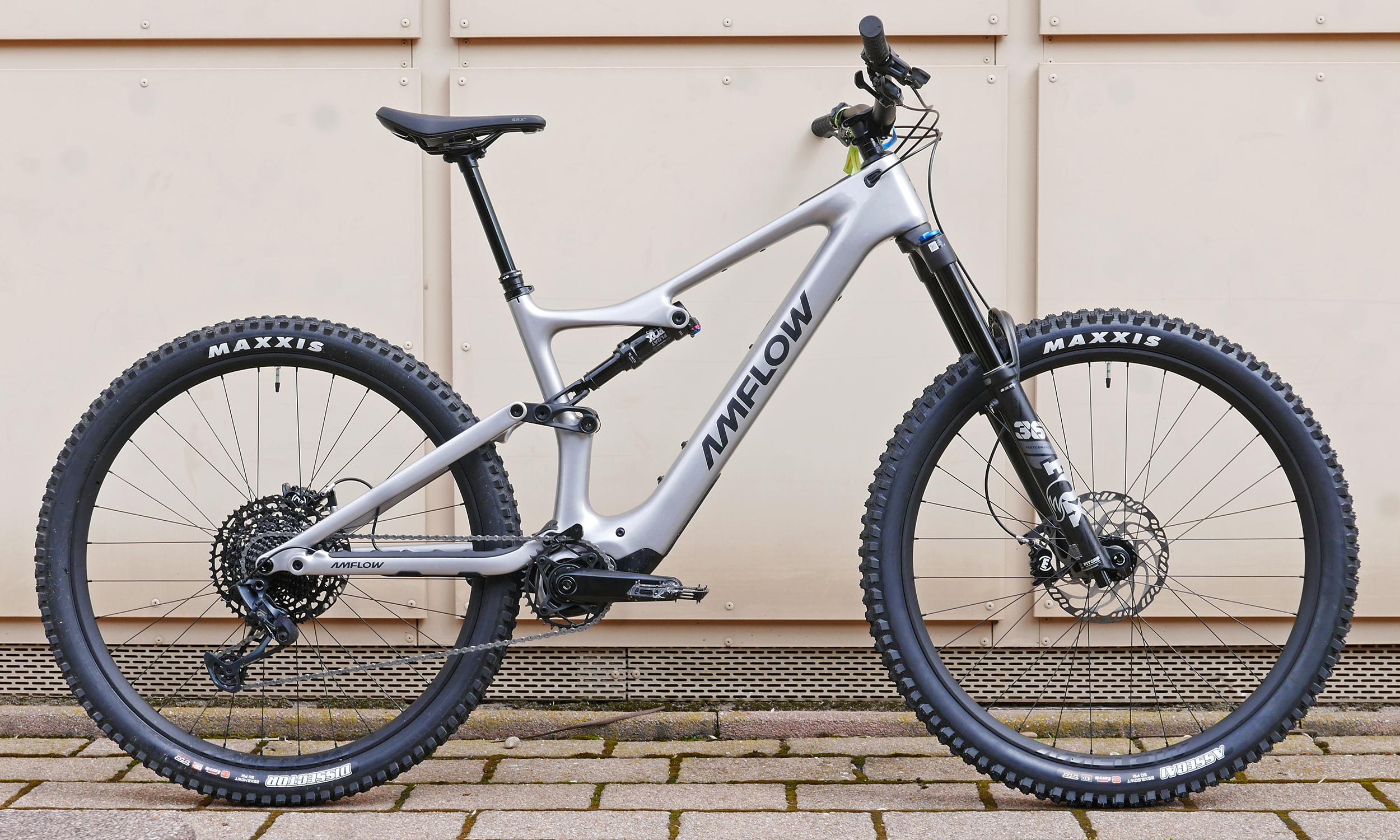
OK, so let’s take that closer look at the Amflow PL Carbon ebike itself.
This is meant to be a lightweight full-power all-mountain ebike. It is capable of taking on everything from classic trail riding to bigger mountain rides and more technical tracks that border on the edge of enduro. For that, you get a classic Horst link 4-bar suspension design with 150mm of rear wheel travel, paired with 160mm forks. Amflow lists the PL Carbon frame weight at a claimed 2270g.
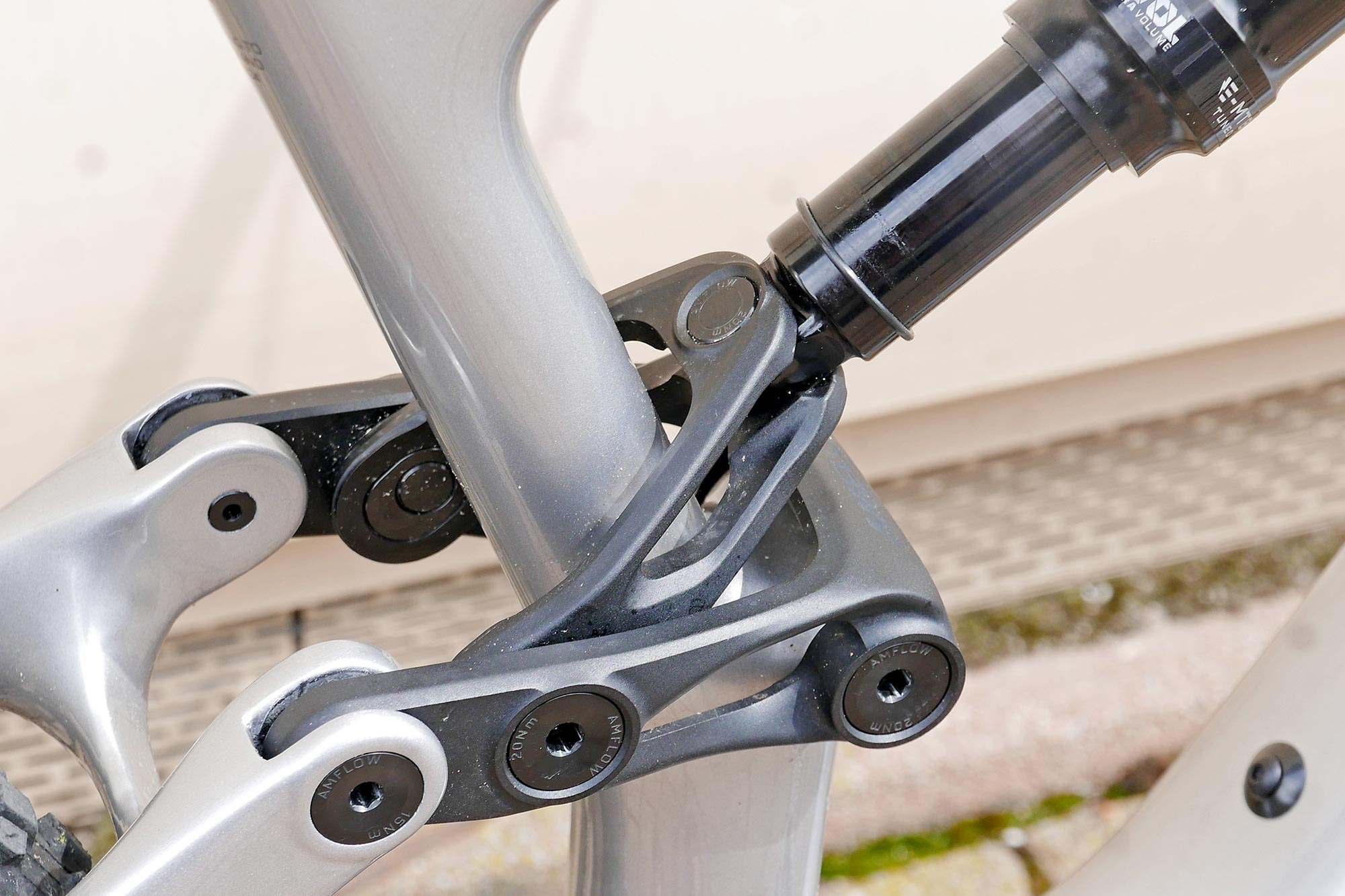
And a relatively progressive slack geometry, with a lower shock link flip-chip that lets riders pick their preferred 29″ or 27.5″ rear wheel size. Either full 29er for more stability… or a mullet setup for a more playful agile ride.
Geometry & Tech Details
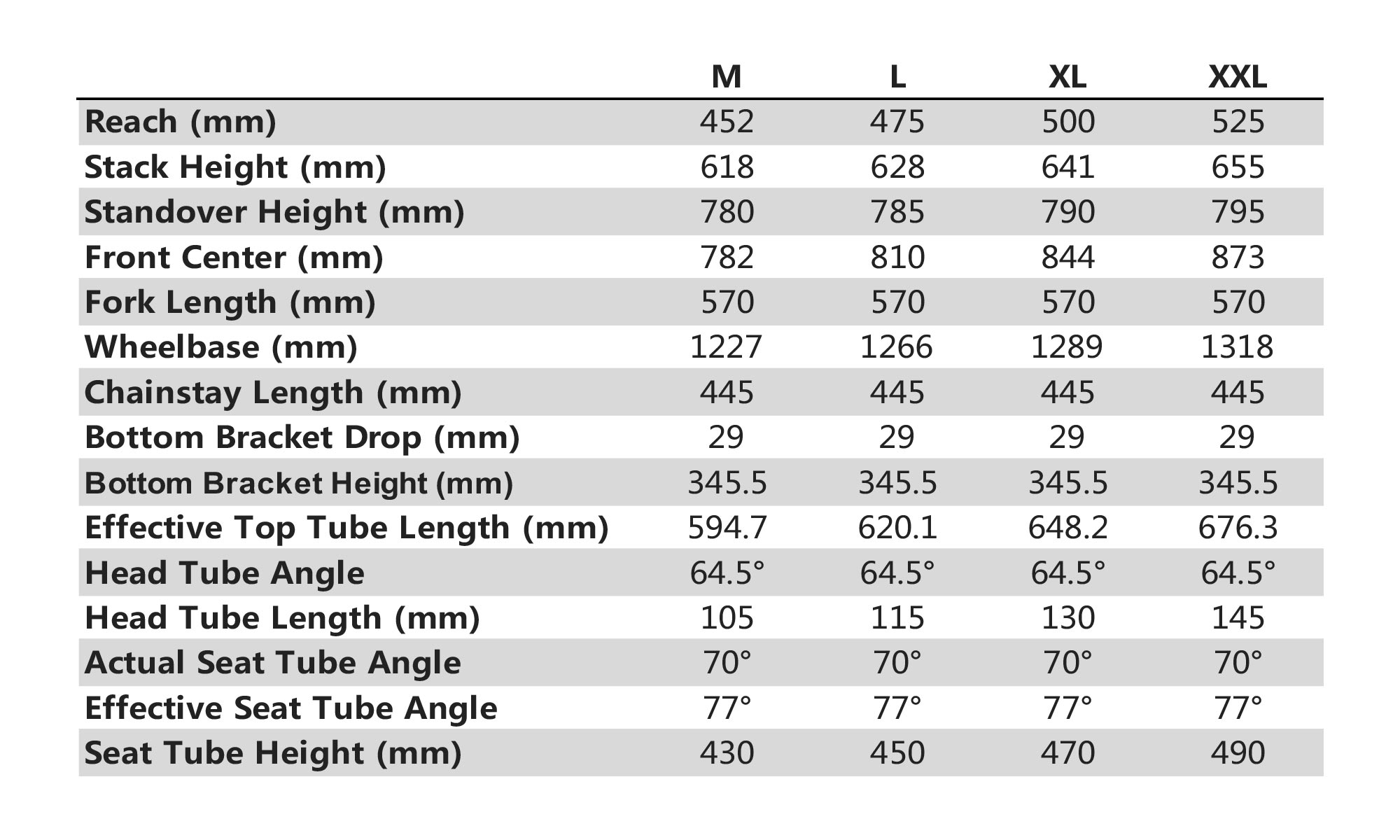
Generally speaking from a geometry perspective, the Amflow PL Carbon seems pretty progressive for a modern trail / all-mountain ebike. Its 64.5° head angle is plenty slack, and the steep 77° effective seat angle should make climbing up hills a breeze. The 445mm chainstays are even quite short for a 29er ebike. And its 4 stock sizes seem like a good spread. But I get the feeling they were mislabeled in the table sent to me (M-XXL) probably overestimating their size. Amflow would better label the sizes as S-XL.
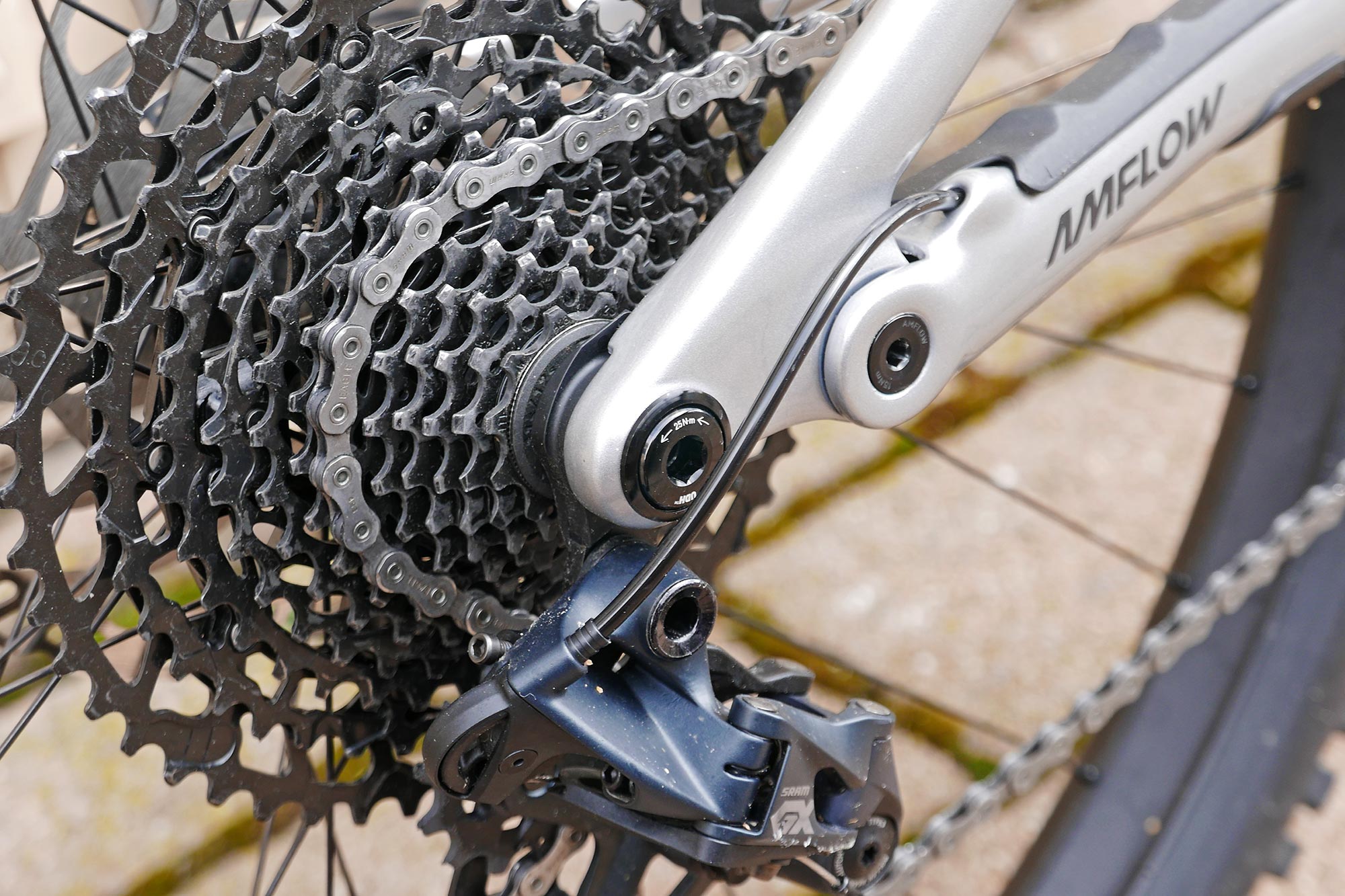
Looking a bit into the ebikes details, we first see a UDH at the end of the Boost rear thru-axle that gives both conventional mechanical and SRAM direct mount T-Type Transmission compatibility.
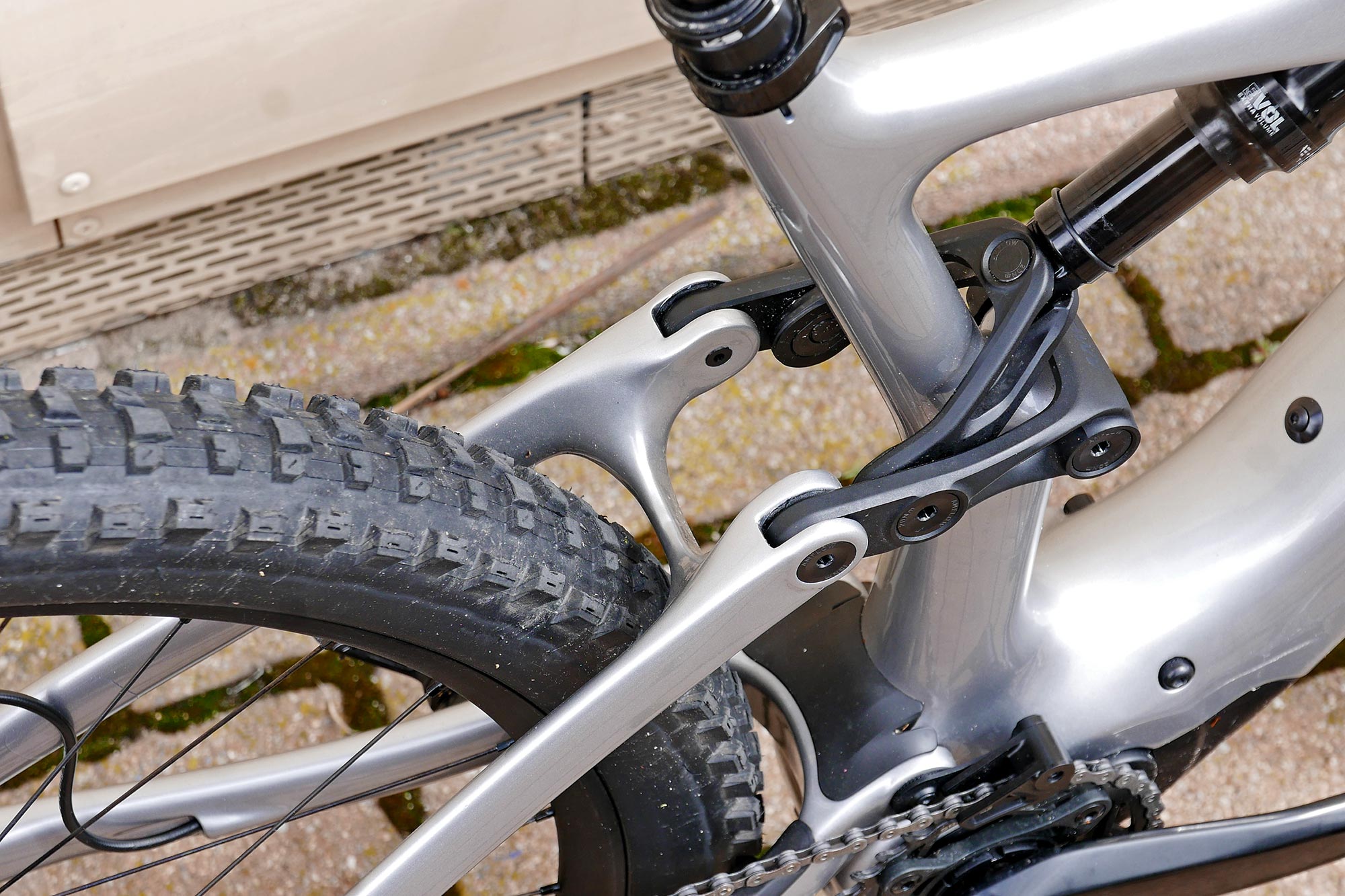
Beyond that, Amflow gives the PL Carbon 2.4″ tire clearance out back, Post Mount 180 rear brake set up with 203mm rotors in the complete ebike builds, integrated chainstay, downtube & motor protection, opening up to an alloy heatsink on the motor body, and integrated mini upper chainguide bolts to the main pivot.
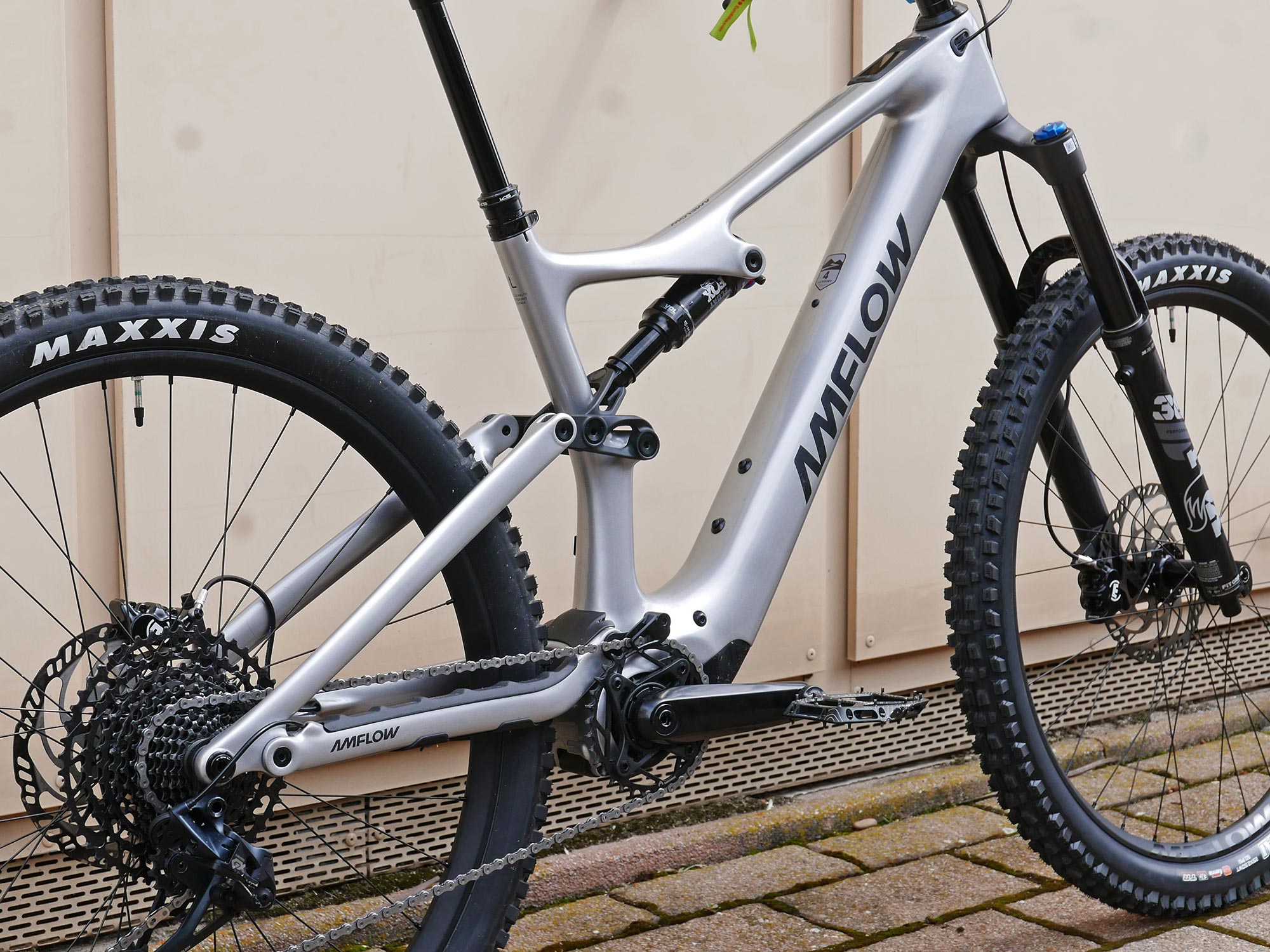
The ebike features conventional internal cable routing entering the frame on the sides of the headtube, compatible with mechanical or electronic groupsets, and a main battery charging port on the lower non-driveside of the seattube.
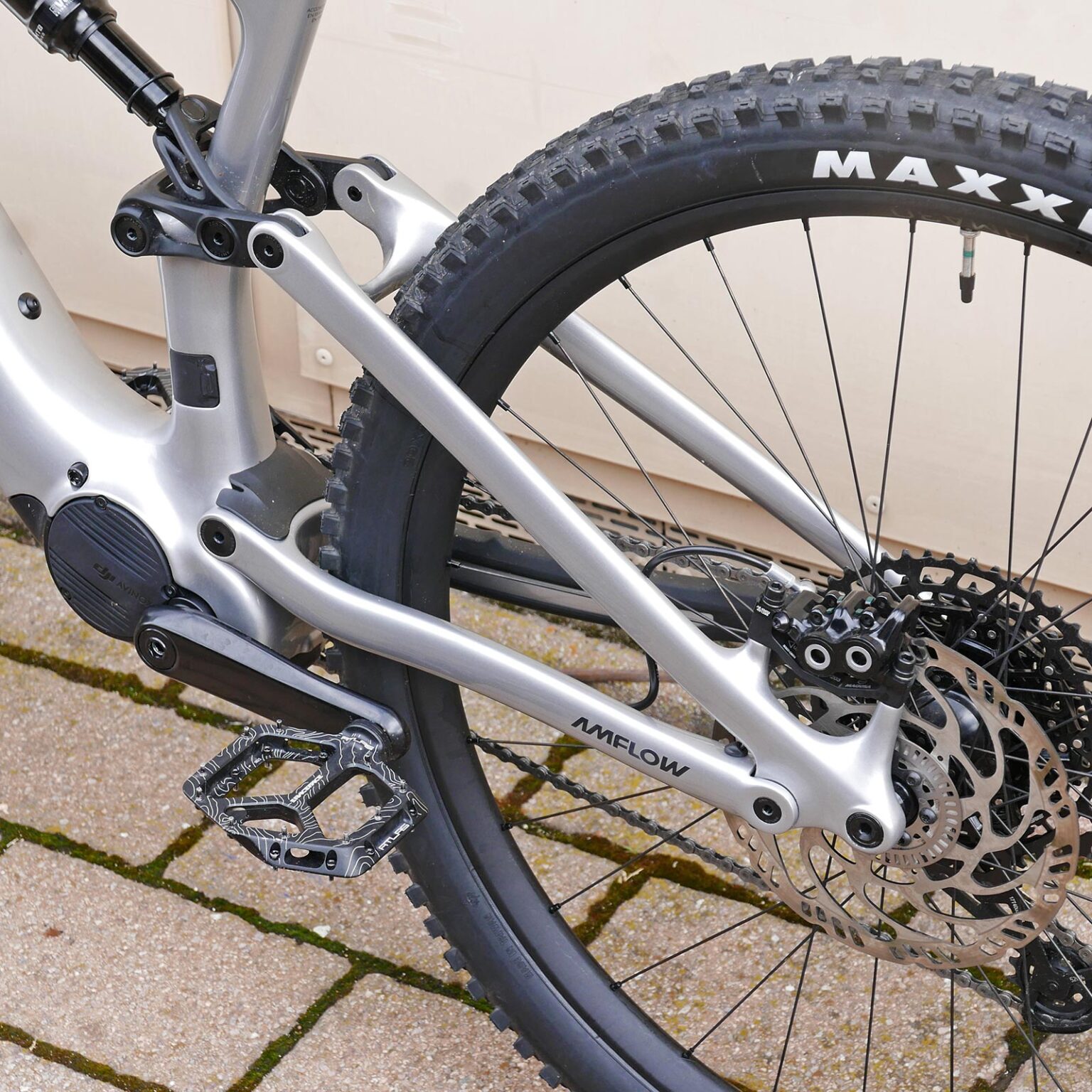
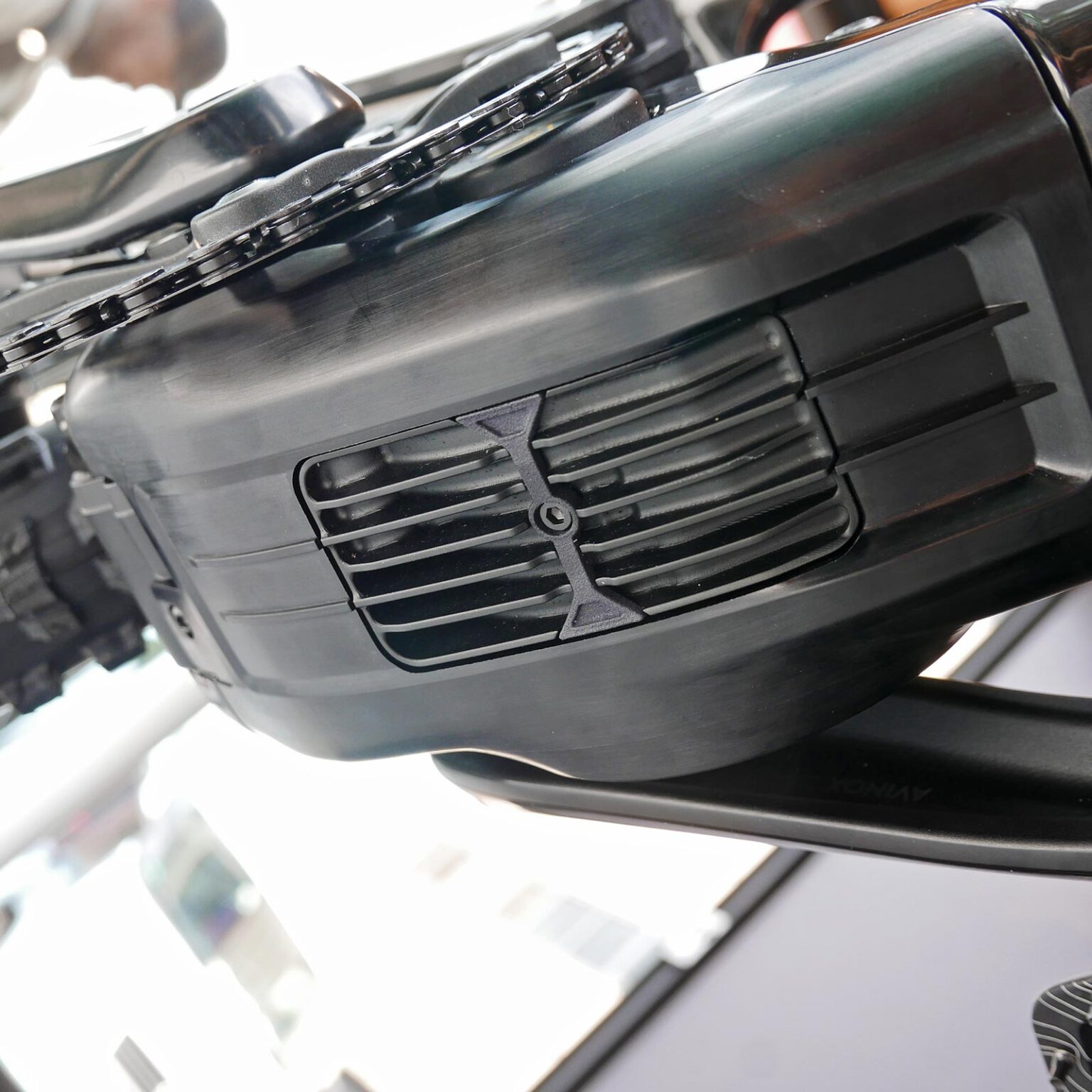
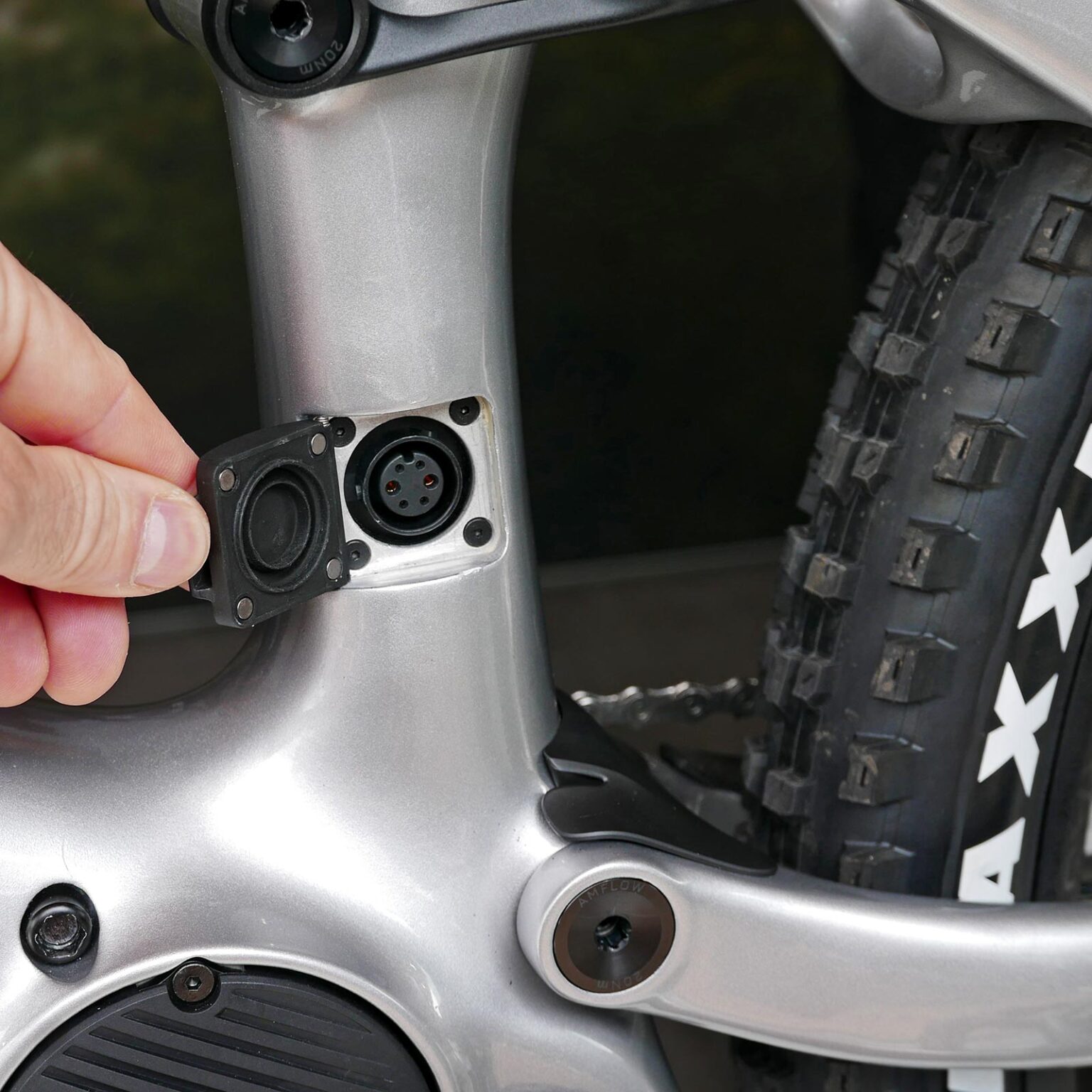
There’s a single water bottle cage mount inside the main triangle under the Trunnion mount shock.
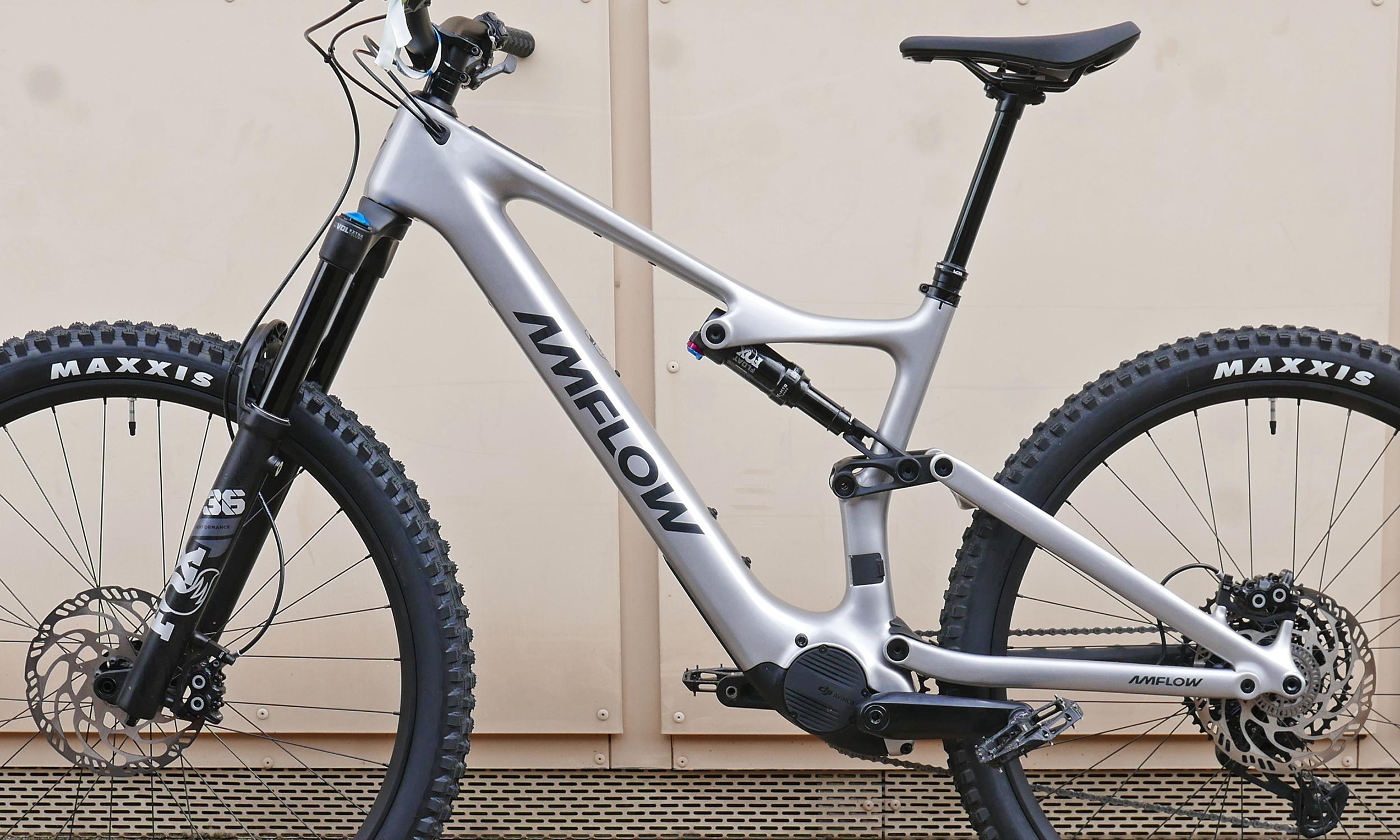
Plus, Amflow provide another tool carrier mount under the toptube, where a semi-rigid custom bag fills the space in front of the shock.
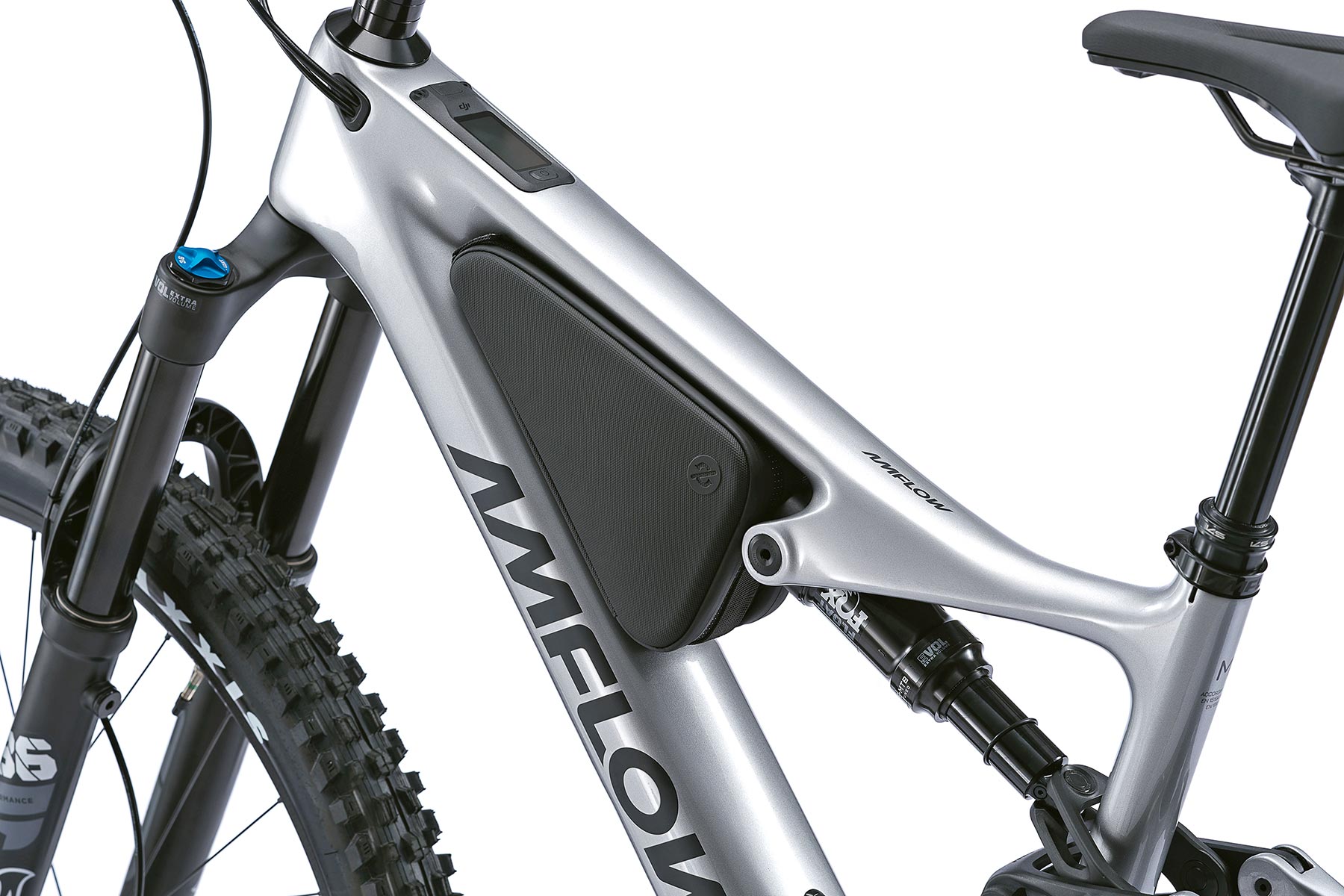
Powered by DJI Avinox
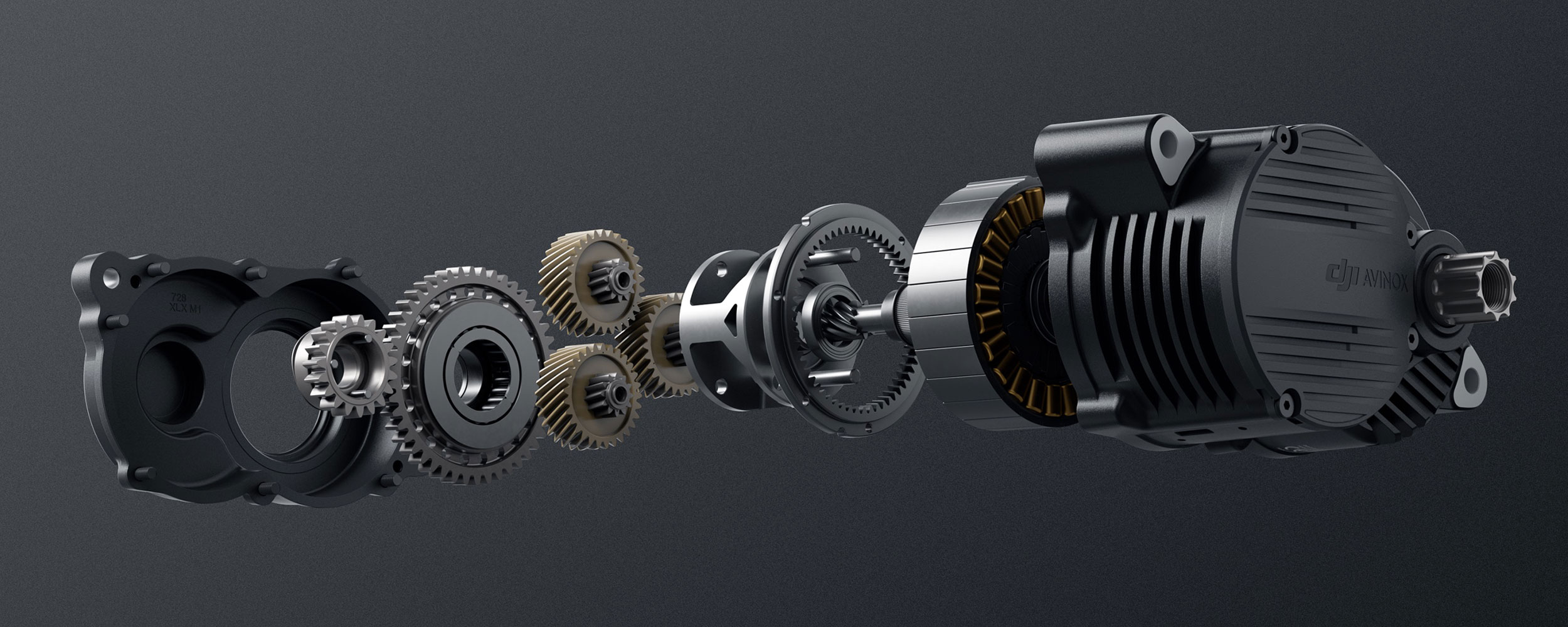
The main selling point of the Amflow PL Carbon’s new DJI Avinox ebike drive system is its unique combination of lightweight and high power output. A claimed 105Nm of torque from a motor that weighs just 2.5kg, and 600Wh or 800Wh batteries that claim higher energy density (Wh per gram) than anything else on the market. But there’s also some unique smart tech tucked into the Avinox system.
DJI Avinox ebike drive system’s smart tech features
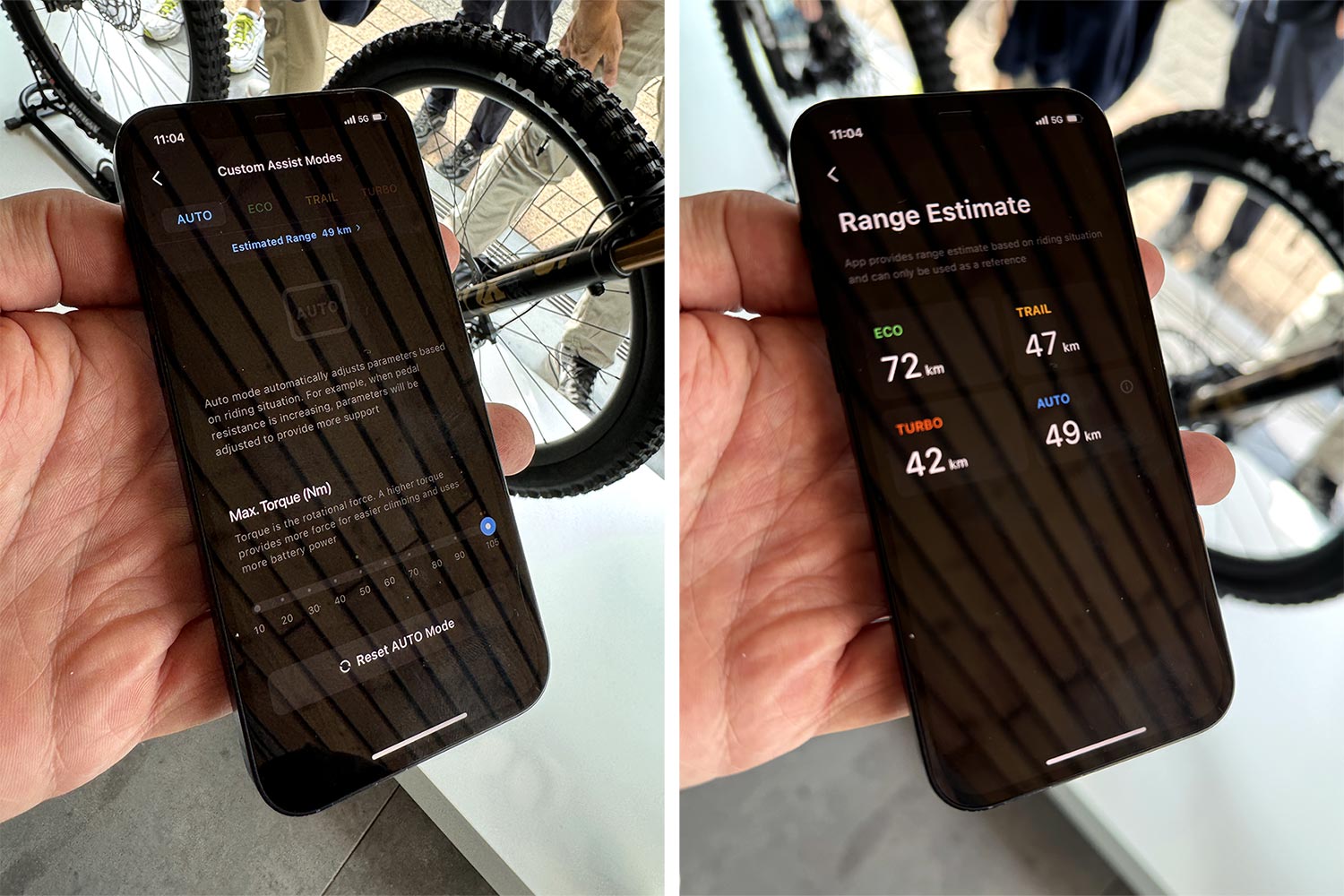
Most interesting it seems may be the smart Auto pedal-assist mode. You can stick with conventional Eco, Trail, or Turbo – topping out at a momentary peak power of 850W. But switching to Auto is said to leverage DJI’s expertise in power management, by collecting inputs from position/accelerometer/torque/cadence/rider input sensors, to let the algorithm-tuned mode automatically determine motor output. DJI says Auto will provide extended range compared to standard Trail or Turbo but still with powerful pedal-assist when you need it.
Dual wireless Bluetooth controllers next to each grip, let you easily cycle through support & display mode, while also putting Boost mode at your fingertips. Hit the Boost button, and the DJI Avinox motor cranks out a peak assist up to 1000W for up to 30 seconds, before dropping back to whatever mode you were already using.
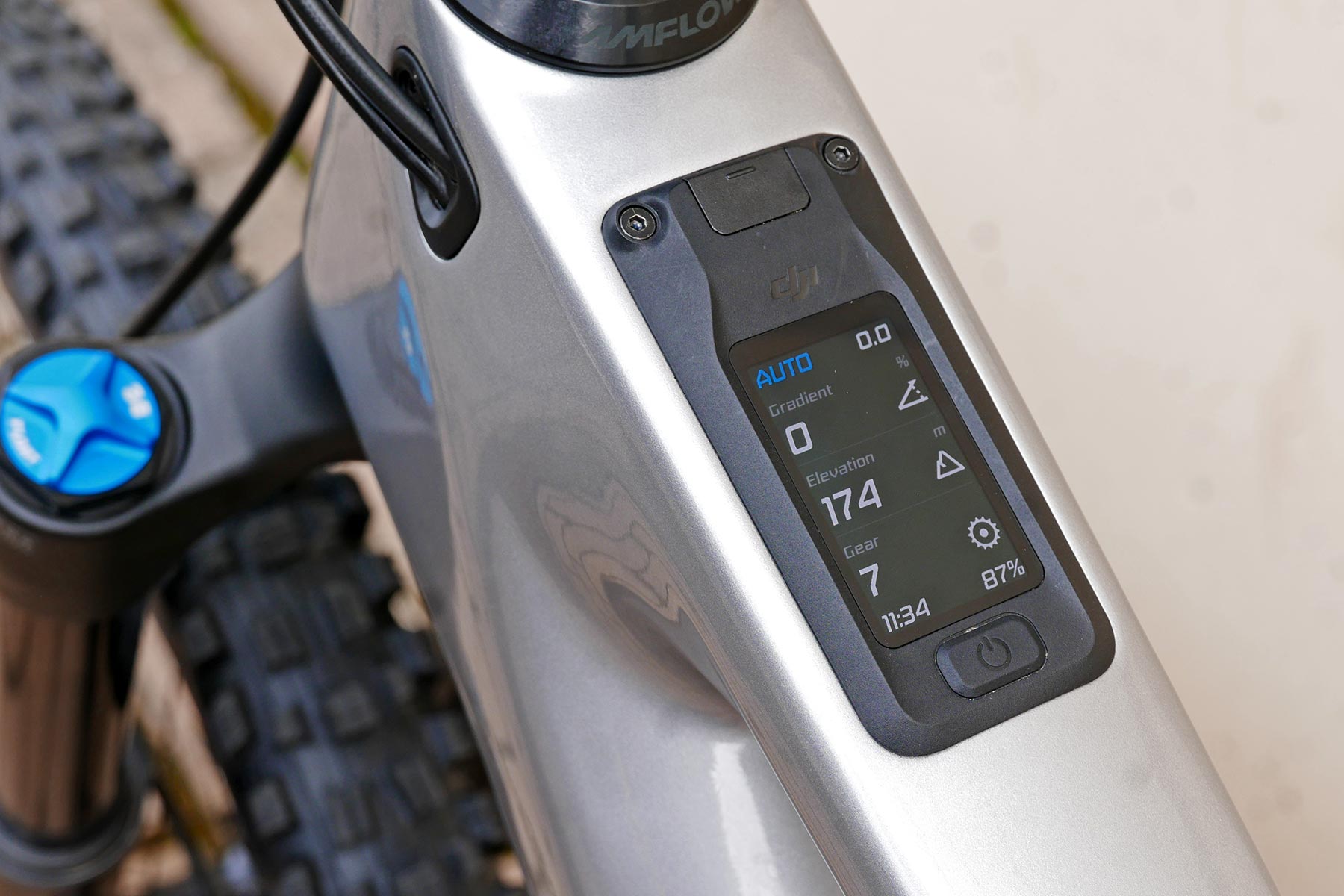
Then, integrated into the PL toptube, Amflow places DJI’s 2″ full-color OLED touchscreen control display. It shows you all the ride metrics you’d want from a conventional cycling computer, plus easy-to-navigate real-time activity data, mode info, and estimated range. And it logs it all with your GPS data to sync with the Avinox app and 3rd-party apps like Strava.
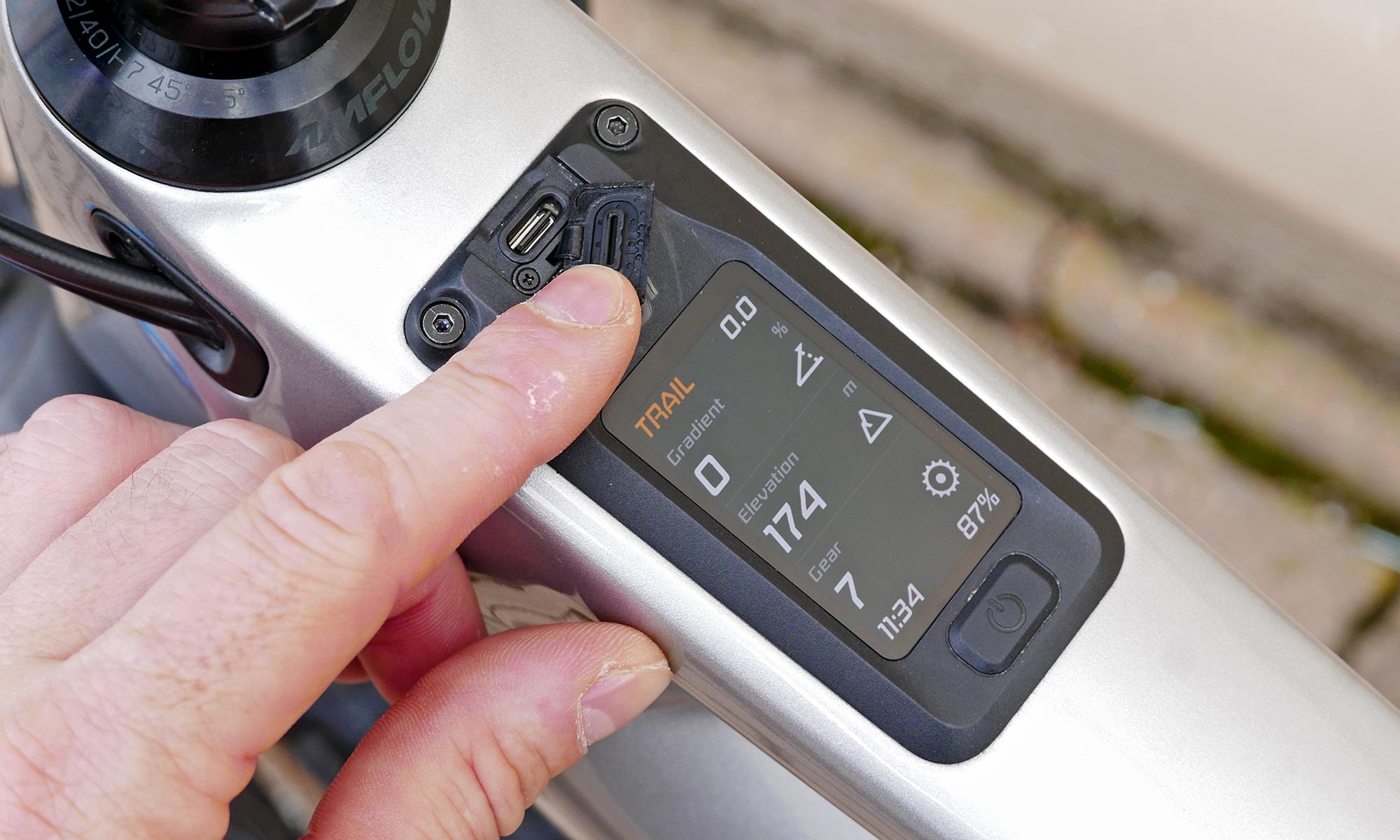
Plus, the display has a USB-C port that you can use to charge your connected devices while riding – like while navigating with maps is your smartphone.
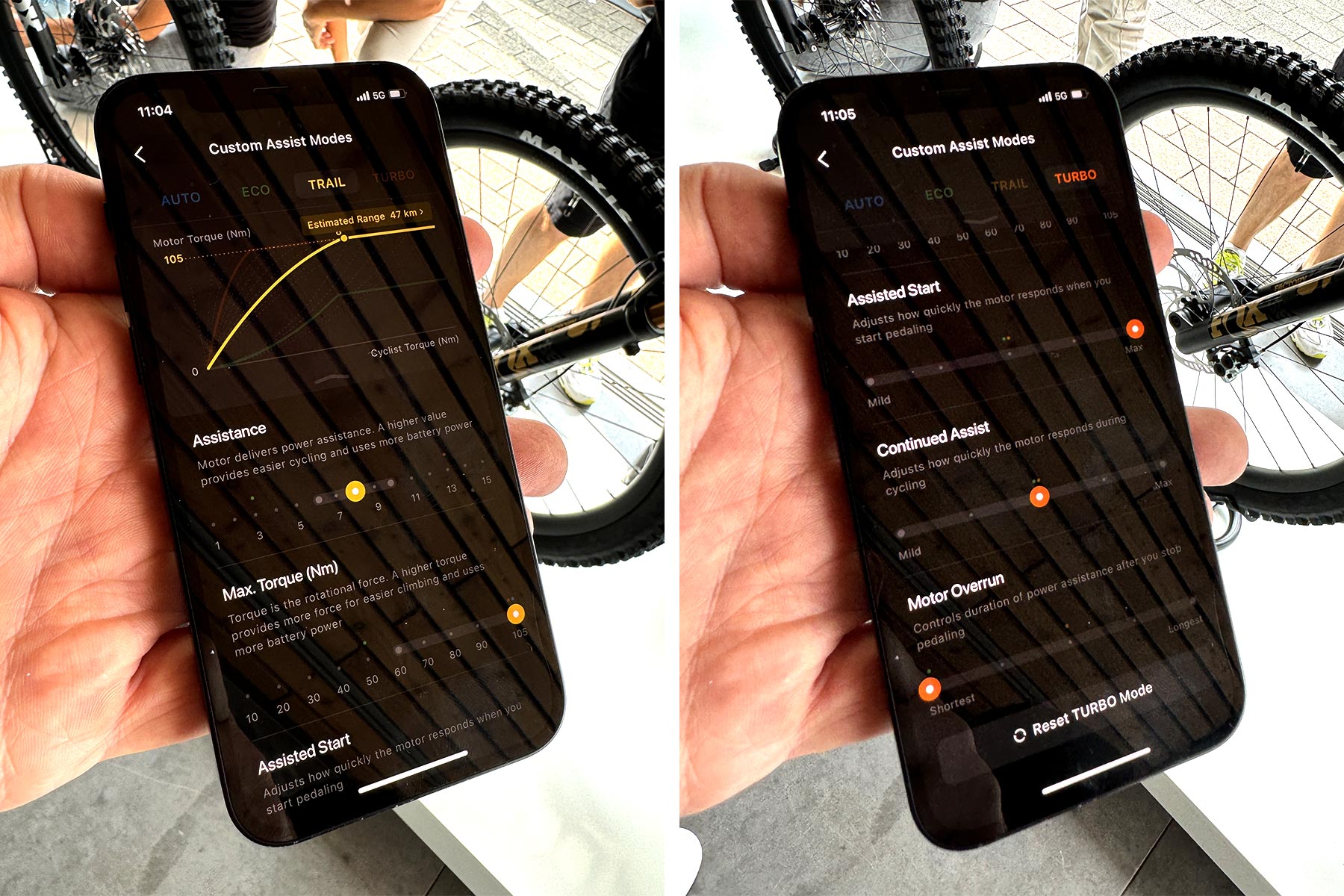
The Avinox smartphone app also give users the ability to fine-tune each pedal-assist mode more than pretty much any other ebike drive on the market. You can pick how much power it delivers relative to your pedal input, max torque level, how responsive motor output is from a start or while pedaling, and how long the motor continues to output power after you stop pedaling.
Amflow PL Carbon – eBike Options & Pricing
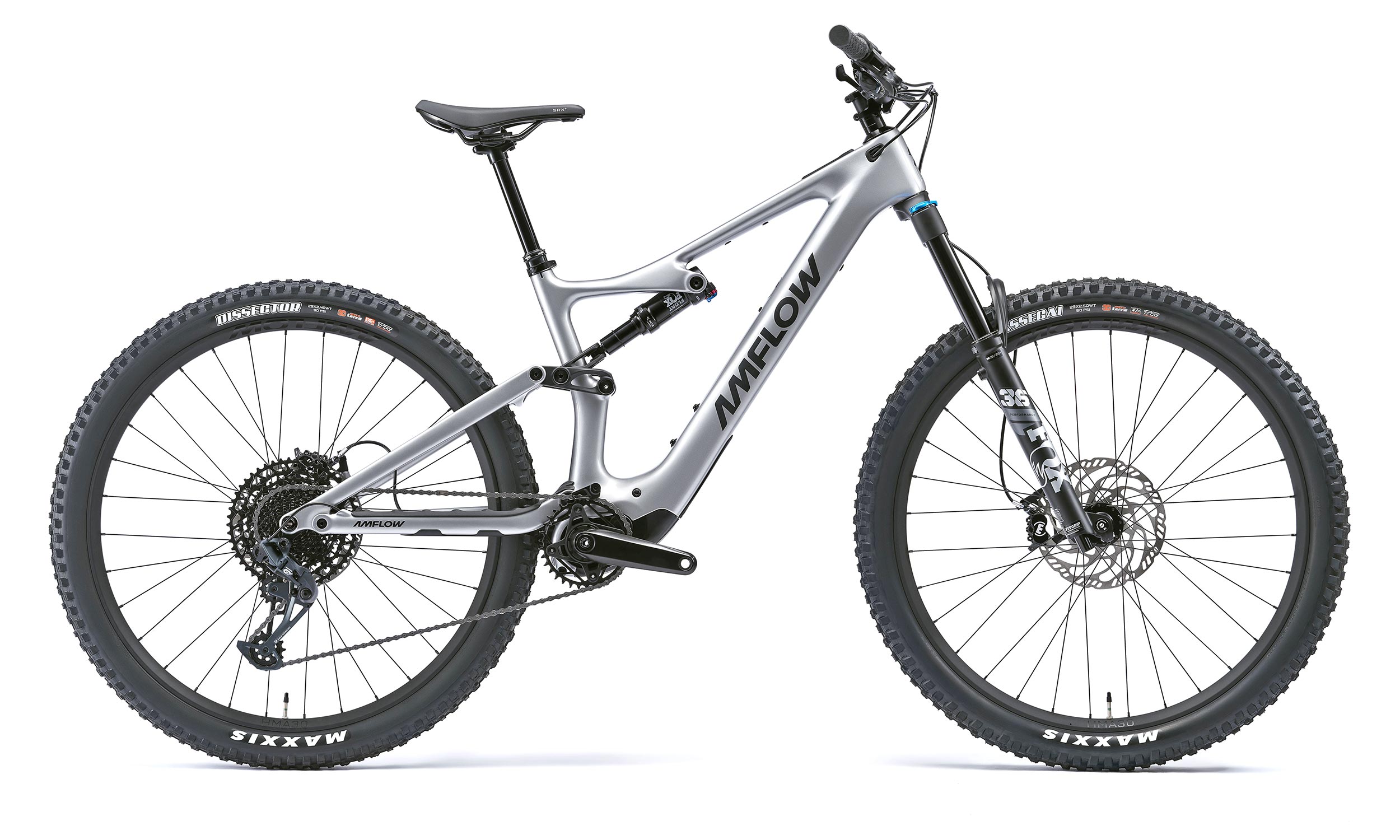
The first new ebikes from upstart Amflow include two models of this all-mountain Amflow PL, each sharing the same full carbon frame with 150mm of rear travel powered by the DJI Avinox ebike system. And either available in silver of black.
The slightly more affordable end of the spectrum like we took a closer look at… will stick with a mechanical SRAM GX drivetrain, Fox Performance suspension, alloy wheels, and an 800Wh internal battery.
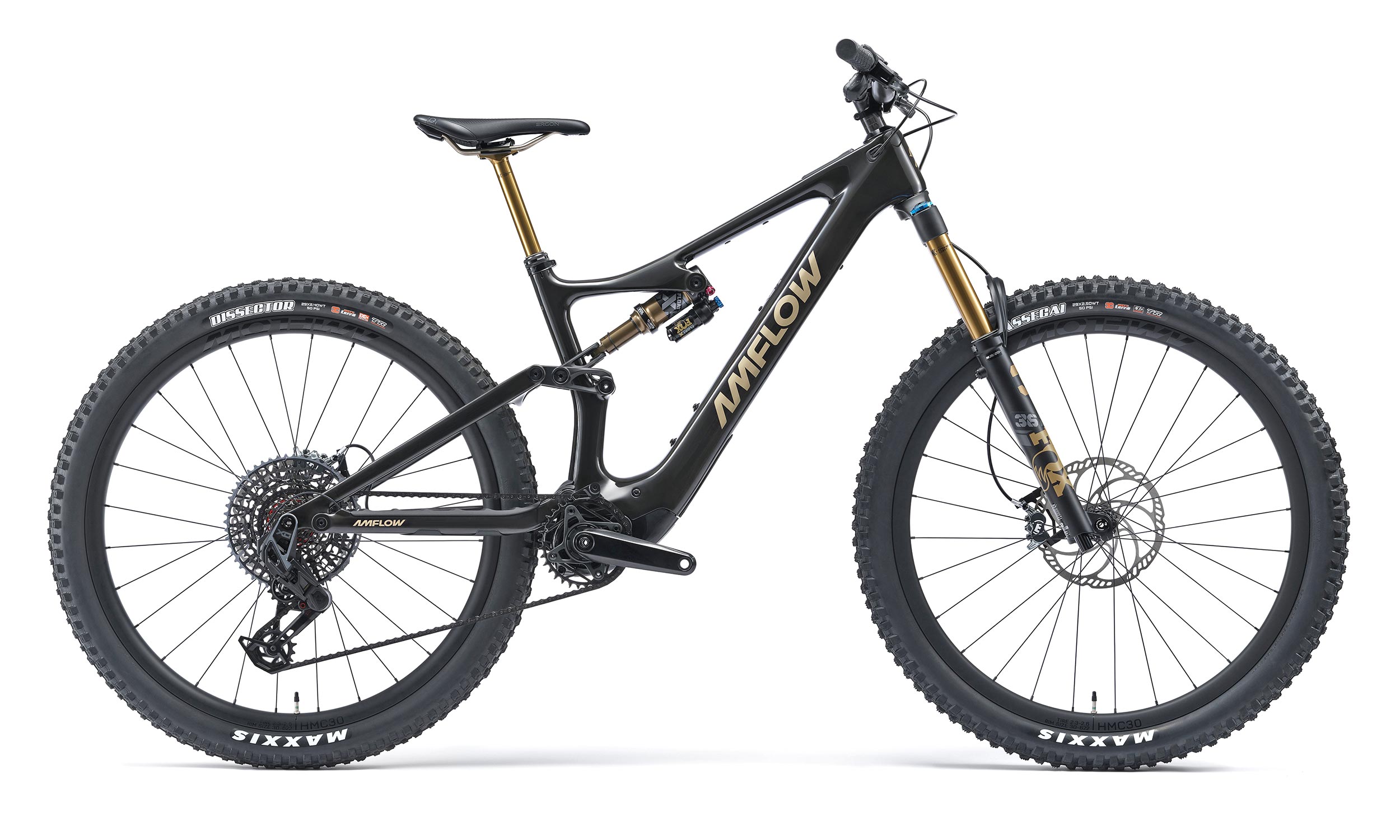
Then, the top Amflow PL Carbon Pro will upgrade to an X0 AXS transmission, Fox Factory suspension, house-brand carbon wheels, and the option for either the big range 800Wh battery or a lighter 600Wh variant.
And Availability?
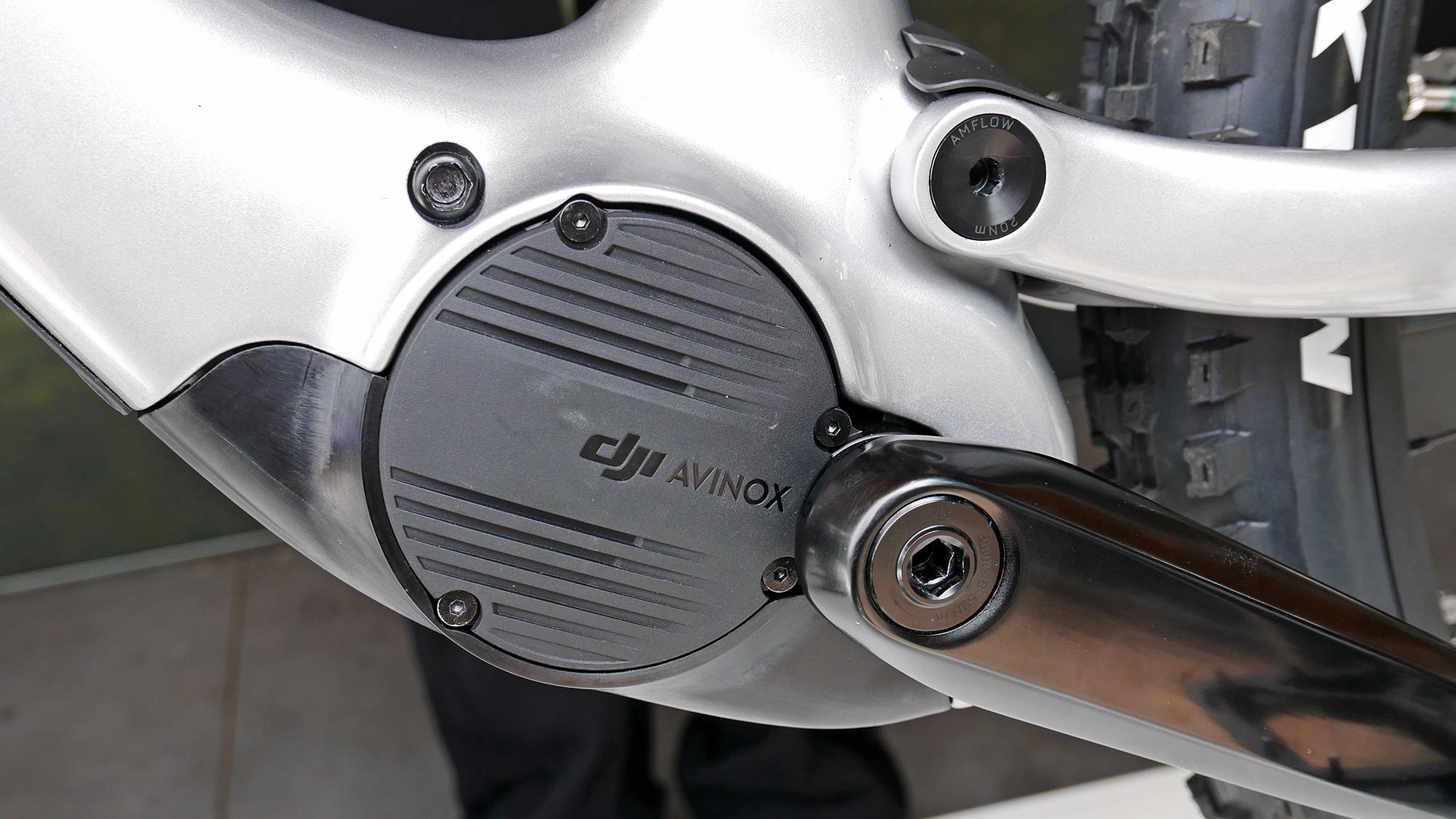
When, where, and how much exactly it will cost you to get a new Amflow PL ebike with the latest DJI Avinox system remains vague.
Amflow tells us official pricing is still “TBD”, but expected to have both bikes in the 7000-12,000€ range. Yes, that sounds quite high for a company and motor that we’ve never tried, but it’s certainly on par with the top-tier light ebikes we’ve ridden from the likes of Scott, Specialized, Focus, even Merida.
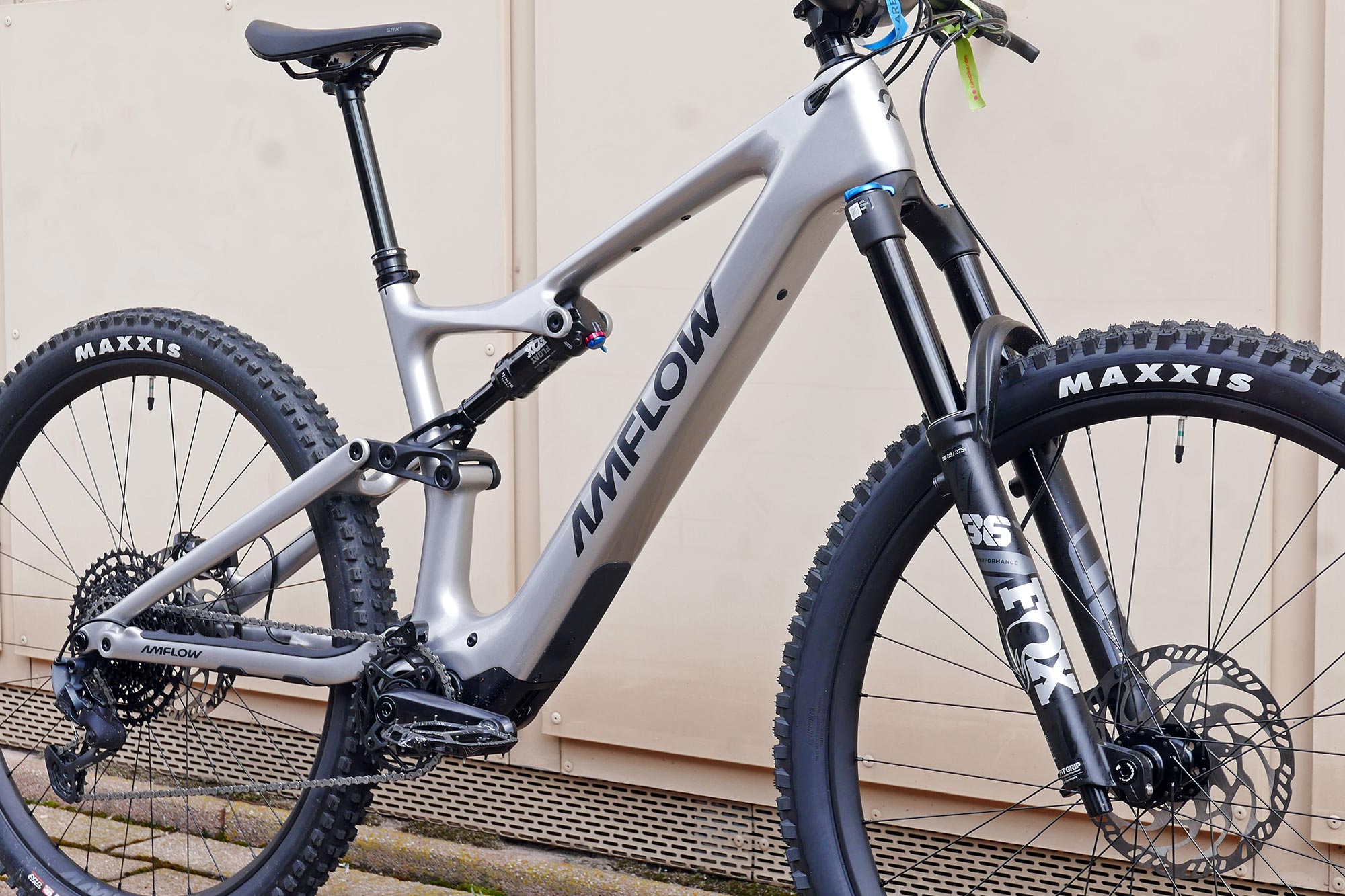
What we do know though, is that Amflow will first roll the new PL Carbon out in Germany, the UK, and Australia by the end of this year – sold primarily through classic independent bike dealers. In fact, Amflow now says the first Amflow ebikes should be sold to German & Australian consumers as early as October, while the UK should get these first DJI-equipped ebikes in November. Then, Amflow ultimately plans to broaden availability throughout Europe and North America, although without a firm timeline yet. Amflow also mention availability through other “alternate dealer paths“, but haven’t elaborated more yet. We’ll keep our eyes out for what that will mean.
And maybe most importantly in the meantime, we expect to have a new Amflow PL Carbon ebike with the DJI Avinox motor to test in less than one month’s time. Stay tuned, and we’ll report back with our on-trail impressions very soon!
